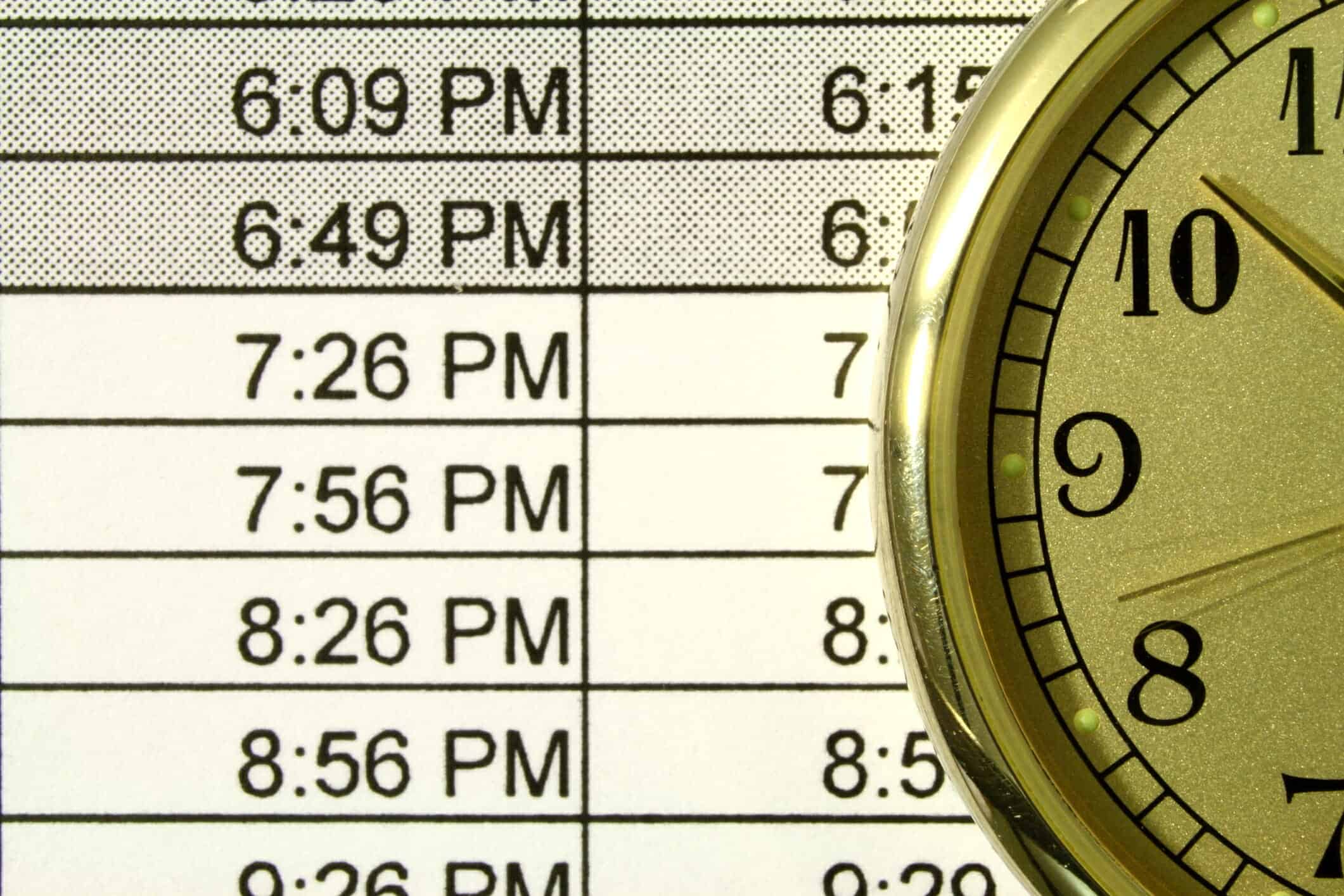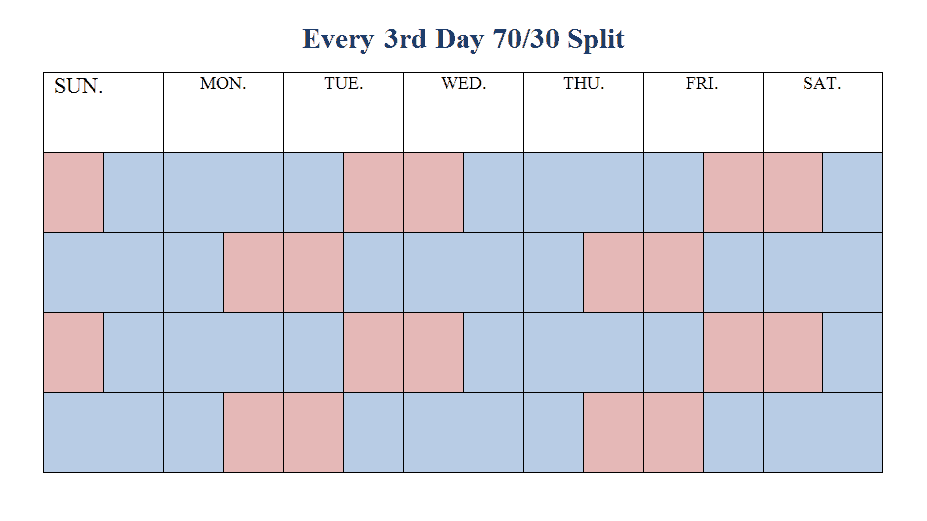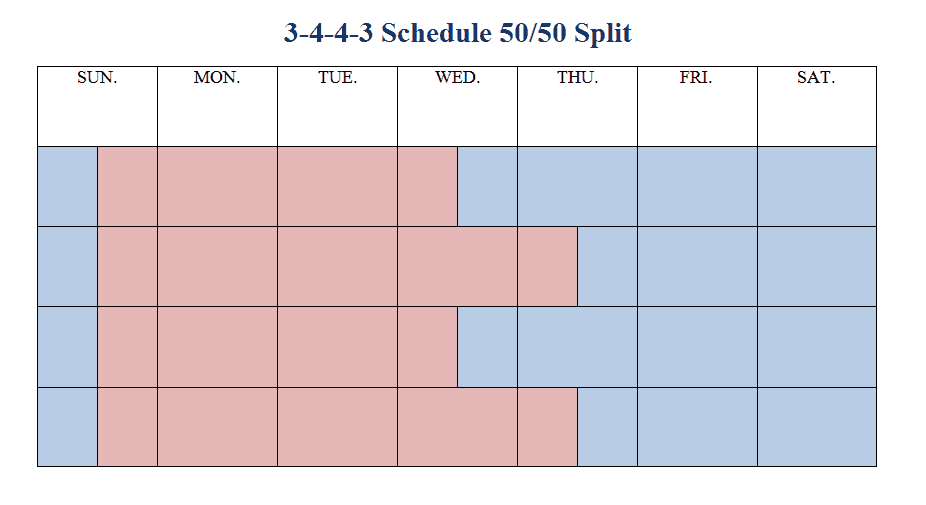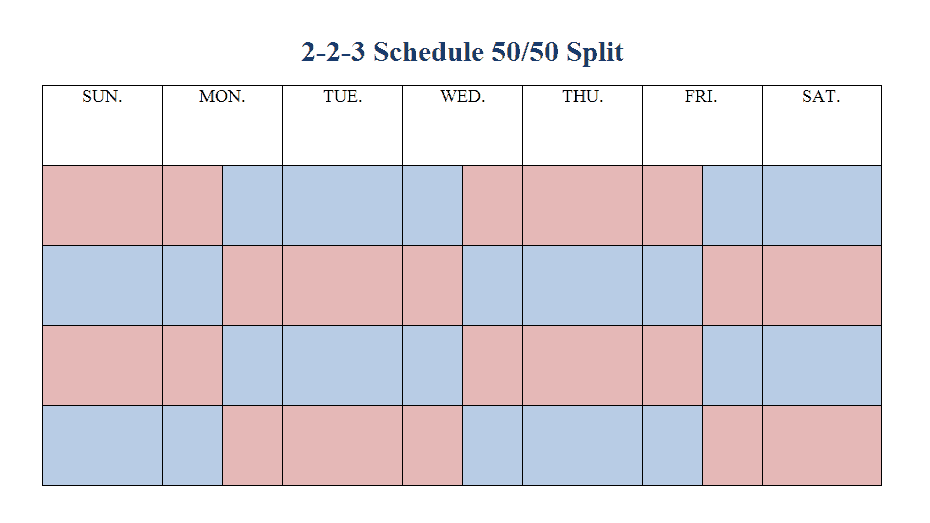If you are a parent and you are facing divorce, one of the first things you probably thought about was, “What is going to happen with the kids?” You have visions of having to spend weekends and holidays without them. You worry about what will happen to the kids when they are not with you. Most of all, you know that, now that you are getting divorced, you will need to make some sort of a co-parenting schedule. But you're not exactly sure what that looks like.
Making a workable co-parenting schedule can be challenging. But once you understand how co-parenting schedules work, what they should cover, and what they should look like, making one becomes way easier.
Do You Need a Co-Parenting Schedule?
Lots of people wonder whether they really need to make a formal co-parenting schedule. The short answer is: Yes. You do!
If you have a decent relationship with your spouse, writing down a detailed co-parenting schedule seems like overkill.
It's not.
If you have a horrible relationship with your spouse, writing down a detailed co-parenting schedule can be torture. You'd rather have a root canal without anesthetic than have to haggle with your spouse about dividing up the time with your kids.

But, battling out your co-parenting schedule now will save you from having a nuclear war over it later.
Here's the bottom line.
No one has a crystal ball. Whether you and your ex are getting along great now, or fighting like a Tribute in the Hunger Games, things can change. Relationships change. You or your spouse may re-marry. One of you may move. Your job schedules may change. In short, a lot of things you can't foresee now can affect your time with the kids in the future. If you don’t sit down and map out a co-parenting schedule now, dealing with future changes will be infinitely more difficult.
A Co-Parenting Schedule is a Blue Print
Some people are hesitant to make a co-parenting schedule because they don’t want to be locked into a fixed schedule until their children turn eighteen. What you have to realize, though, is that a co-parenting schedule is more like a blueprint than it is a finished house.
Your co-parenting schedule is the “default” mode for when you see your kids. If you and your ex have a good relationship, and if you can work together as parents and be flexible in your scheduling, you can each see your kids on whatever schedule you want. You can follow the co-parenting schedule, or bury it in a box in the basement. It doesn’t matter.
If you and your ex don’t get along, though, that is when your co-parenting schedule becomes critical. If you can’t agree on anything else, then each of you will each see the kids according to the co-parenting schedule that is part of your divorce judgment.

Who Needs a Co-Parenting Schedule?
In some states, like Illinois, courts require parents to make a parenting schedule before they will grant you a divorce. Other states encourage, but don’t require, parents to make a parenting schedule. Either way, the answer to the question, “Who needs a co-parenting schedule?” is the same: Anyone who is a parent!
While making a co-parenting schedule may seem like a lot of legal mumbo jumbo, if, six months after you divorce, you and your ex start having issues surrounding when you will see the kids, your co-parenting schedule will wind up being the most important document you ever made.
What Makes a Good Parenting Schedule?
Making a parenting schedule seems like it should be an easy enough task. You just sit down with your spouse and a calendar and decide when the kids will be with you, and when they will be with your spouse/ex.
Yet,as anyone who has ever tried to make a co-parenting schedule knows, it's not that easy. The worst part is that by the time you figure out that your co-parenting schedule doesn't work, it has already been incorporated into a court order. If your ex won't agree to change it, you have to go back to court to do so. Doing that is difficult and expensive. That's why creating a co-parenting schedule that works -- before you get divorced — is so important.
7 TIPS for Creating a Co-Parenting Schedule That Works:
1. Put your kids FIRST.
Putting your kids first means creating a co-parenting schedule that allows them to spend enough time with you and your ex so that they can have a meaningful relationship with both of you. It means that you don't “keep score” of who gets five minutes more time with your kids.
Putting your kids first also means that you keep their comfort and lifestyle in mind. A co-parenting schedule that requires them to spend half their childhood in a car traveling between homes will not be pleasant for them. Having to split holidays and spend half of each day with both you and your ex will be exhausting.

Putting your kids first means that sometimes you're going to have to suck it up. Sometimes you're going to have to be alone when you would really rather be with your kids. Like it or not, putting your kids first means being an adult.
2. Think logistically.
If you and your ex live two hours away from each other, then mid-week overnight parenting time is not going to work. (Unless you don't mind getting up at 4am to get your kids to school in the morning!) It's not enough to put together a pretty co-parenting schedule that looks good on paper. You've got to really think it through and make sure it works!
Thinking logistically also means figuring out how you are going to manage your kids “stuff” as they go back and forth between houses. Your kids will need to transport clothes, toys, and sports equipment with them. They are probably not going to want to cart all that stuff to school with them. So, if you exchange the kids at school you've got to deal with all the things they carry with them from house to house.

3. Be realistic about the holidays.
Deciding who gets the kids during holidays is often one of the most difficult parts of making a co-parenting schedule. Not only do you have to deal with your ex, but you have to deal with your ex’s extended family as well. If your ex’s extended family (or yours) lives far away, crafting a workable holiday schedule becomes even more challenging.
If making a holiday schedule has you tied up in knots, take a deep breath! Then take a good, hard look at your family’s traditions. Consider what your family has typically done for the holidays. If you and your kids have spent every Christmas out of town at your ex’s parent’s house, chances are your ex is going to want them to continue that tradition. But taking the kids to their grandparents' house every Christmas after your divorce isn't exactly fair to you. Like it or not, you're both going to have to share. What that probably means is that each of you will get the kids for an extended period of time on one Christmas, and not at all on the next.
4. Don't forget about vacations.
Both parents are entitled to take vacations with the kids – even if they don’t “go” anywhere! Your co-parenting schedule should give both you and your ex vacation time with your kids. It should also address how many weeks of vacation time each of you gets. You also need to state whether your vacation weeks can be taken all at once, or only in one week blocks.
The other challenge with vacation time is scheduling it. Your parenting schedule should clearly state which of you gets first pick of vacation time in any given year. You would also be wise to try to get everyone's vacation on the books no later than May 1 every year.
5. Work with a calendar – preferably one with all of the major holidays on it.
One of the biggest mistakes parents make when creating a co-parenting schedule is not putting it on paper first. You may create a schedule that, in theory, will work fine. But, when you write it on a calendar, it turns out to be a disaster! If you work with an actual calendar from the start, you will see any scheduling problems immediately.
Using a calendar will also remind you to deal with some of the lesser holidays you might otherwise forget. While you don't have to divvy up every conceivable holiday (although some parents do), you also don't want to overlook a holiday that is important to you. You also don't want to forget school holidays when someone has to watch the kids.

6. Don't get caught up in "One Size Fits All" thinking.
Not all parents work traditional 9 to 5 jobs. Not all families are going to be okay with a co-parenting schedule that allows one parent to only see the kids every other weekend and one evening a week. Your parenting schedule needs to fit your family.
Every parenting schedule is unique (or, it can be). Do not allow your lawyer, your neighbor, or anyone else to convince you that you have to make a certain parenting schedule because “that is just the way it is done.” This is YOUR family. You need to do what is best for all of you.
7. Be flexible and specific.

Life changes. Parenting schedules need to be flexible to accommodate those changes. But, flexibility only works if you and your ex can maintain a reasonably civil relationship after you are divorced. Not everyone can do that.
If you know that working with your ex in the future is going to be difficult, then your co-parenting schedule needs to be very detailed and specific. Take the time to list every single day and time each of you gets the kids – especially on holidays. While writing a lot of detail can make you crazy, it can also save you a lot of grief later.
Sample Co-Parenting Schedules
Seeing your schedule on paper can put it in perspective in a way that words simply can not achiever. (That's why using an actual calendar works so well!)
While there are many different types of parenting schedules, here are a few examples of the most common ones that divorced parents use. (The pink shaded areas are for mom, the blue are for dad.)



This post was originally published in August, 2017 and updated on April 30, 2025.


These are some great tips, and I appreciate your advice to try and form new traditions for the holidays. I’m about to start the divorce process, and one of the things I’m most concerned about is my children. We have some pretty solid family traditions that we do, especially around the holidays, and I’m worried about how the divorce will affect them. I’ll definitely try and keep an open mind, and I’ll try to start some new traditions of our own. Thanks for the great post!
You are welcome.